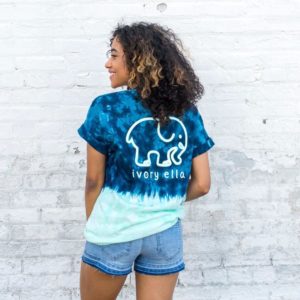John Allen was still a student at Temple University when he and five friends started Ivory Ella, which, just two years later, is generating well in excess of $10 million in annual sales by marketing almost exclusively to its millions of social media followers.
Allen and his partners already had built a business selling inexpensive jewelry that they promoted via social media, and they were generating $20,000 to $40,000 per month in sales, Allen says. But they wanted to build a brand around a product of their own, so they scoured the social sites they all frequented for an idea. That’s how they discovered elephants.
“We saw a love and passions for elephants,” Allen, now 24, says. “Everybody wanted to support them, talk about them and bring awareness to elephants. We saw a great opportunity to give people what they wanted.”

John Allen, CEO, Ivory Ella
They printed a long-sleeved shirt with images of elephants on the front and back and began promoting it to their social media followers, promising to give part of the proceeds to the preservation organization Save the Elephants. “I thought if they sold out in a month that would be amazing, and if they sold out in a week, fantastic. They sold out in 17 minutes,” Allen says. They ultimately took orders for $600,000 worth of shirts in the first week, and a business, Ivory Ella, was born, with Allen as its CEO.
Today, Ivory Ella sells a variety of elephant-themed items, mainly apparel but also such accessories as backpacks and hats. It gives 10% of its net income to Save the Elephants and, in some cases, to other nonprofits such as the American Heart Association and the Breast Cancer Research Foundation.
While the privately held company doesn’t disclose its income, Allen says it’s well above $10 million a year and projected to grow 30% this year compared with 2016. And it’s profitable: The e-retailer has contributed nearly $1.2 million in profits to various causes in its two years of existence, Allen says.
The secret of its success, and profitability, is that it’s marketing for free to some 60 million followers on social media. That includes 547,000 Twitter followers of @shopivoryella. But the bulk of those fans are following what are called, in the world of social media, “parody accounts.” Such accounts are built around a theme and not an individual.
For example, Ivory Ella’s founders are behind the Twitter account @TheBucktList, which has 1.38 million followers and features photos and comments about once-in-a-lifetime things people want to do, such as watching the sun rise over the Grand Canyon or bike riding in the Maldives. “When you have a bunch of these accounts specific to certain interests, you know who you’re targeting,” Allen says. “That set us up for success.”
In all, the Ivory Ella team operates social media accounts with 60 million followers, Allen says, and it targets young women ages 13 to 24. When Ivory Ella introduces new products, such as a line of athletic wear it launched recently, it blasts out the news on social media.
“That’s where our customers are hanging out most of the time,” Allen says. When Ivory Ella runs promotions, such as its every-other-night giveaways or new items, “we want them to see us.”

One of the many elephant-themed shirts sold by Ivory Ella.
While its products can be purchased through Facebook Inc.’s QuickBuy shopping section, Allen says most sales are on IvoryElla.com.
The company now has 70 full-time employees and a 50,000-square-foot warehouse. While it buys shirts and other items, it handles the printing, fulfillment and customer service, Allen says. Ivory Ella is printing 6-10,000 shirts per day and has the capacity to fulfill 15,000 orders every day, he says. It is exploring products that go beyond its elephant theme, and tested products featuring lions in January.
While Ivory Ella has not raised any funds yet, it is exploring that option and has engaged investment bank Stephens Inc. to advise it. “We want to be a clothing conglomerate,” Allen says. “We’re looking for someone to help us take the next steps to be a bigger player, whether that’s through financing or a strategic partner.”
“There’s definitely interest in this space,” says Andrew Norwood, a vice president at Stephens who works with e-commerce clients. That includes interest from “strategic” investors—retailers—as well as venture capitalists and growth equity funds.
They are especially interested in “vertically integrated” e-retailers that create their own branded products and then sell them online, rather than selling products from other brands. “A lot of strategic investors,” Norwood says, “are looking at digitally native, vertically integrated brands as a way of expanding their marketing presence.”
Among the recent deals in which established retailers and brands snapped up online retailers that sold at least some of their own branded products are Wal-Mart Stores Inc.’s acquisitions of ModCloth and Moosejaw, Unilever buying Dollar Shave Club, Samsonite International purchasing eBags Inc., and PetSmart purchasing Chewy Inc.
There are likely to be more such deals as big retailers seek to adapt to the ongoing shift to online shopping, says Matt Sargent, senior vice president of retail at consulting firm Magid Associates. “More and more of these retailers are having to quickly adapt,” Sargent says. “And the fastest way to do that is through acquisition.”
Allen says Ivory Ella is on the right side of history at a time when traditional, store-based retailers are struggling. “We’re selling online and interacting with our customers on social media,” he says. “We feel we’re kind of the new school option, and that’s only going to get bigger.”
Favorite